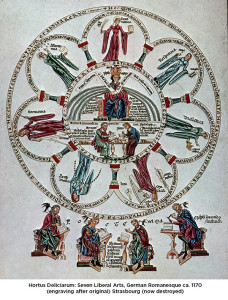Did you hear about the young German louts who got in to the sacred shrine in Mecca in Saudi Arabia and went around pulling off the face veils of Muslim women there? No? Me neither. I did, however, hear about what happened at Cologne cathedral, where large groups of immigrants went round systematically groping and assaulting young German women, in at least two cases going so far as raping them. Why is it that we do not hear about the first, but our front pages are full of the second? For the simple reason that we have lost all confidence in the values of our own society. Consequently, those values will in turn be lost.
Consider this thought experiment. There are four tribes leaving close to each other. These four tribes are peaceable, and they trade various products easily. All is well. Now imagine that one of the tribes changes in such a way that they become warlike; they are no longer interested in trade with the neighbouring tribes, instead they simply decide to take up arms and go in to take what it is that they want. The other three tribes face a dilemma. If they do not resist in a warlike fashion, then their tribes will die and be assimilated. If they do resist in a warlike fashion, however, then their culture will be changed, from a culture of peace to a culture of war. As a result of the one tribe changing, all the other tribes will change, and the ‘culture of war’ has become universal. The culture that chose to become warlike has succeeded in changing the other cultures – even if they do not win militarily.
This is now happening in Western Europe. Muslim countries which are much more restrictive in their attitudes about sexuality and the role of women in society are now succeeding in imposing their own cultural values upon the West. Consider the advice that the Mayor of Cologne has given to the young women there – that they are to ‘stick together in groups, don’t get split up, even if you’re in a party mood’ and so on. Soon, no doubt, well meaning political leaders will start arguing that young women need to dress modestly if they are to go outside, then soon after that they will start saying that ‘it is only prudent’ that young women don’t go out without a trusted male relative to look after them. At that point we will have succeeded in importing muslim cultural standards wholesale into our society. Do we really want this to happen? And if we don’t, how will we make sure that it doesn’t happen?
Do you remember the ‘Arab Spring’? There was such a sense of optimism that various regimes in the Middle East would throw out their dictators and a wonderful rainbow unicorn fairy land would emerge. There was one incident in Tahrir square, however, which was deeply disturbing, and was clearly a harbinger of what was to come. The CBS reporter Lara Logan was caught up in a mass sexual assault by dozens of young men. She was rescued by the security services and flown back to the United States where she spent four days in hospital being treated for her injuries. This form of assault has a particular name in Egypt – it is called taharrush gamea. Young men seek the cover of a large crowd, and then pick on the vulnerable with impunity. The German police have now admitted that this is what happened in Cologne.
According to Gibbon, the Western Roman Empire did not fall because it was beaten militarily by the barbarians, but rather because it had first succumbed to a spiritual and moral defeat. That is, those who exercised power on behalf of the Empire no longer believed in a higher purpose to what they were doing. I believe that we are in a similar position – our spiritual roots have been discarded and we have lost ourselves in a search for material gratification, we have ‘sold our inheritance for a mess of pottage’. Yet I do not believe that the culture and civilisation of Europe is doomed to the same fate as the Western Roman Empire. If we are to avoid such a fate, however, we need to remember and renew our own spirituality, and refresh the well-springs of our own culture.
The reason that we do not hear about young German louts acting offensively in Mecca is because entry to the sacred sites there is restricted to those who are Muslim. The Saudi authorities take their religious obligations seriously, and this is both a source of strength and a symptom of strength. By way of contrast, we have turned our great cathedrals into tourist venues, picturesque museums which show how our ancestors lived. The vibrant vitality of our historic culture has now been absorbed into mindless consumerism, the confessional becoming the selfie.
We are facing a challenge to the very foundations of our civilisation. If we are truly to continue on an enlightened and Enlightened path then we need to start taking steps to ensure that those values that we are most committed to are transmitted forward. This is not a matter simply of words, although words are essential, but also of action. We need to embody our highest values and not simply pay lip service to them. Unless we become a virtuous people once again then our values will pass into history and forgetfulness.
A start to this process would be to reclaim control of our own borders, so that we can make sure that we can decide for ourselves whether we wish to endure the delights of taharrush gamea in England. Just one more reason for voting to leave the EU when the time comes.










You must be logged in to post a comment.